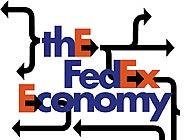The Flying Spare

I second the nomination of David Leonhardt's "Have Recessions Absolutely, Positively Become Less Painful?" for a Voxy. I am not sure that I sign on to the term "micro-recession," but this is a wonderful piece of journalism that helps illuminate why the macro economy have been giving mixed signals over the past 4 years. The focus of the article is on how FedEx, riding in the HOV lanes of the global shipping highways, has made its operational model more flexible, thereby allowing the U.S. economy to weather more difficulties without sharp, economy-wide declines in output. The title of my post is drawn from:
On a recent Wednesday, the empty plane that departs each night from Las Vegas had to travel to San Diego - rather than making its usual flight to Memphis - to fill in for a broken plane. But ground workers in Las Vegas had become so used to its completing its typical route that they had loaded some packages marked for the Memphis hub onto the plane. The packages ended up in Oakland instead.
"That's the risk with that flying spare," Mr. Dunavant, using company lingo for the empty planes, said during the call. "That's one of the things they get lulled to sleep on."Besides Las Vegas, the flying spares leave from Duluth, Minn.; Laredo, Tex.; Fort Myers, Fla.; and Portland, Me. All take circuitous paths to Memphis, passing near major cities like Dallas, Denver and St. Louis.
On a typical night, one of the five makes an unexpected stop to collect an overflow of packages, one lands to bail out a plane needing a repair, and three arrive in Memphis as empty as they were when they took off.
Until a year ago, FedEx used just one flying spare, leaving from Las Vegas, but executives decided they needed an even larger reserve army to fight uncertainty. Every night, the company also keeps about 10 percent of planes half empty, allowing them to make unplanned stops and pick up more cargo.
There is an interesting lesson here that is often forgotten--less volatility of the outcome is often the result of more volatility of the inputs, to smooth out the impact of unexpected shocks to the production process or market demand.
Imagine if passenger airline companies were paying this much attention to their business models, or if other industries in which distribution is essential planned so well for daily contingencies, ...
Blogsearch Technorati

5 comments:
Fed ex is doing well because of all the overnighted offer and severage mailings (big changes in labor force participation rates since 2000).
Consumers are also a little bit punchy with spending.
I guess one way to play this is to borrow home equity and invest in Fed Ex or similar-
Hello Fed Ex Economy!
I can not go along with the Voxy nomination because I think it misses or does not adequately discuss two very big points.
One: Fed Ex does well because of churn and decline in labor force participation.
Two: Fed Ex does well due to growth of consumer spending and consumer debt (increasing amounts of products shipped direct to home). This may (or may not) increase when people are not working and have time to buy stuff at home. This is a result of an instant-gratification, pleasure-seeking, short-term culture as much as it is any savvy by Fed Ex.
Three: Sure, Fed Ex did not blow it, but neither did UPS or DHL. It is a bull market for these companies, similar to airlines in the late 1990s.
Praising FedEx may have some similarities with hailing someone for making money in the Nasdaq in 1999 as a visionary.
I take issue with the illustration of the "flying spare". We're not told why a flying spare is any better than a "parked spare". A parked spare could be routed only slightly less quickly than a flying spare, and probably wouldn't use as much gas. Why is the flying spare better? Why is it so much better, that it wins the title line of the story?
The Voxy praises the article for informing us about these features of the FedEx economy, which I think we all agree are subtly becoming more important. That I think these are virtues of the economy is of secondary importance.
On John's specific point, I think parked spares would be fine, too, if the company decided they were the more efficient way to go. It would have made for a less interesting title, though.
Credit where credit is due...
Let's not forget that the FedEx "method" is a direct copy of the system UPS set up. FedEx was started by former UPS managers...
Post a Comment